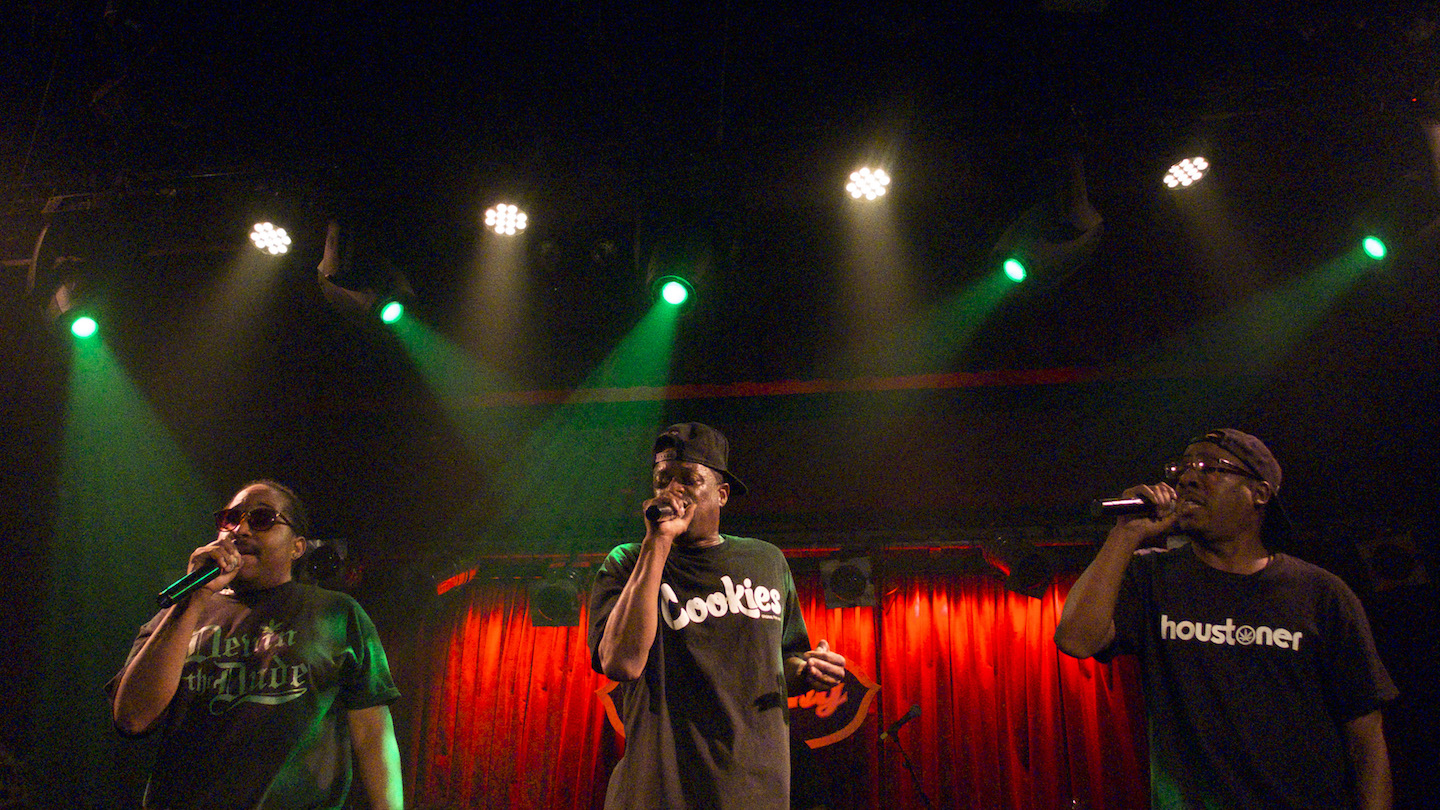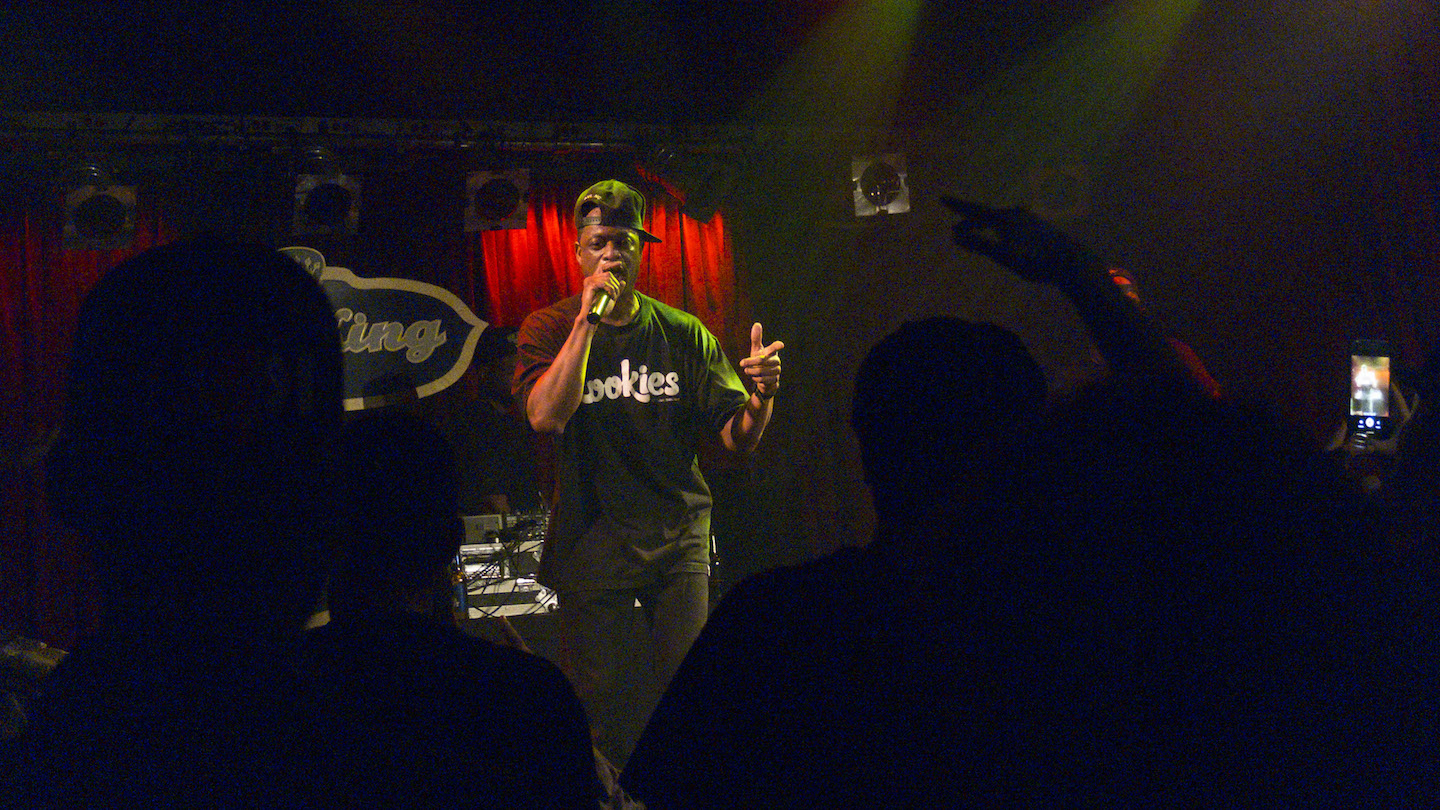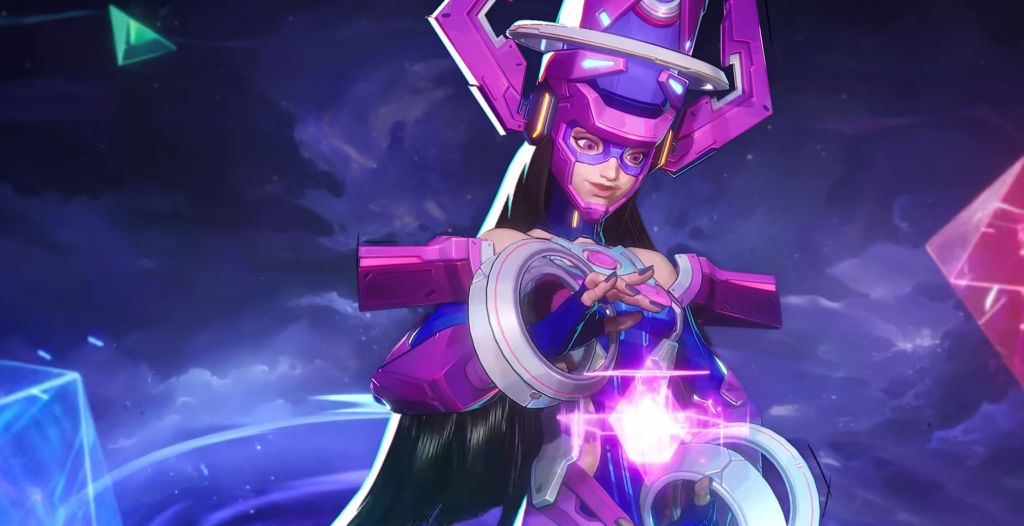Houston-based rapper and Rap-A-Lot Records alumnus Devin the Dude has released nine solo albums since 1998. It’s a discography that includes such titles such as Waitin’ To Inhale, Landing Gear, and Suite 420. He has songs titled “Reefer and Beer,” “Doobie Ashtray,” and “Do You Like Getting High?” It is no secret that most of Devin’s discography, including his album art, describes altered states of existence. In March, he released Acoustic Levitation, following a four-year break since his last album, aptly titled One More for the Road. Acoustic Levitation is named after the scientific process of using sound to balance the force of gravity in order to move physical objects. And to Devin, the title “is a play on words,” because he is elevating his listeners solely with his new songs.
Aside from manipulating corporeal and cerebral states of gravity, though, Devin is a Houston legend who is also appreciated for bending the genre of rap music. Seemingly always behind the eight ball when he raps, Devin stacks self-deprecating lyrics about his own inadequacy on top of warped musical production inspired by “Bootsy Collins, James Taylor, and Johnny ‘Guitar’ Watson,” bringing a different point of view to the genre. Devin said, “it’s a sound that I search for, a little bit distorted and not quite perfect, but it kind of describes the point I am trying to get across.” Devin continually slaps the bravado of hip-hop across the face, and he does so with true artistic sensibility.
Videos by VICE
“I’ve never considered myself a star. I feel like I am no better than anybody else, and sometimes I don’t get the girl at the end,” he told me. Devin’s aesthetic is beyond relatable. For instance, his song, “Lacville ’79,” is about him getting heckled by pedestrians for driving a jalopy. And on “Go Somewhere,” Devin describes his sexual organ as “skinny and cricked.” Within the context of his vulnerability, Devin fastens humility to absurdity for comic relief. On “Almighty Dollar,” which is a song about economic inflation, Devin riffs, “I got a dollar left / might as well give it to somebody else / I can help / tried to hand it to a brother / he said, ‘you are going to need more than this motherfucker.’” Reconciling disappointment and wit is the space where Devin functions best, and is what keeps his loyal fan base captivated.

Odd Squad / Photo by Tahra Yien
In support of Acoustic Levitation, Devin has been touring Europe and the United States with his early rap group, the Odd Squad, which consists of Devin’s longtime friends Rob Quest and Jugg. This motley crew was collectively signed to Rap-A-Lot, which released the group’s cult classic, Fadanuf Fa Erybody in 1994.
I recently saw the trio perform at B. B. King Blues Club in New York City. After the show, I was invited backstage to interview Devin; however, I was informed that I’d be waiting a while because Devin hospitably speaks with every fan who wishes to talk to him. At around 1:30 AM, I finally hopped in the group’s champagne-colored 2006 GMC Savannah, where Devin discussed his ascent in hip-hop, the legends he’s worked with, and the context behind his creative process.
Noisey: Take me all the way back. What brought you to Houston?
Devin the Dude: My family is from St. Petersburg, Florida. I moved to Texas when I was in the third grade going to the fourth grade. My grandmother asked me to come out to Texas before the rest of my family moved there a year and a half later. We moved to the country; East Texas, Douglasville actually.
Douglas, that’s my name.
(Laughs). Oh Yeah? Well, it was in your ‘ville. We were in Douglasville, and the population was 150 at the time. My mom couldn’t really take the small towns, so she got a map and found the biggest city on there. She landed a job in Houston, and that was it. I fell in love with Houston by developing friends, going to school, seeing different types of people, a new environment, and eating different foods.
When did you get into hip-hop?
We stayed in front of a radio station in Florida called WRXB, and it played all kinds of music, so I started breakdancing and collecting albums. Actually, we were doing the Robot. Then when we moved to Texas and the Robot started becoming the wave, we started breakdancing in the 80s.
When did you get into rapping?
When breakdancing started getting commercialized, watered down, and you could see it on butter commercials and shit (laughs).
How did you link up with the Odd Squad?
Me, Jugg and my brother, Dexter had a group called 3D back in like ’88. It was like one of my first groups. We were like a UTFO. We would rap, sing, and breakdance. We were bridging the gap between breakdancing and rapping. And me and Rob met at a TSU talent show. Curtis Blow was supposed to have been the judge. We met at the audition.
Why did you call yourselves the Odd Squad?
My older brother Donnie and I used to go riding, just like this. He saw a group of people with a little bitty midget girl and one tall lanky person and they were looking all different and kind of crazy and he said, “damn, they look like the odd squad.” (Laughs). When we were trying to come up with a name for our group, I suddenly remembered that thing he said about the group of people walking, and it kind of described our style because, at the time, being odd was just being yourself. Back then, everybody was kind of gangster. Or they’d turn into somebody else, having another persona when it came to rapping.
Odd Squad was your first group signed to Rap-A-Lot Records , right? How did that come about?
Yes. We did not have a lot of avenues, but we pressed up a lot of cassettes. We made demo packages and sent them off to different places and record companies. One got in the hands of Crazy C, a guy named Simon, who was working with the Rap-A-Lot artist, Big Mello. And Crazy C was real cool with Rob Quest. They went to church together. Crazy C knew we were trying to get signed to a label, so he got his hands on one of our demo tapes and got it to Lil’ J, who came to Rob’s crib, where we used record on Eagle Street, in Third Ward. He came over there and said he was really interested about signing us. We were really happy about it.

Do you think that because you moved to Houston in elementary school, you may have brought a different flavor to the Odd Squad?
There is little Floridian twang. We had to go to church back then. In church, I was sleeping all the time, and my grandmother made sure I didn’t go to sleep by putting me in the choir. I was learning octaves and stuff, so there is a Southern gospel kind of feel with some of the music we do, and the soul is there because of the church background.
While at Rap-A-Lot, you started working with Scarface‘s old group, Facemob?
Well ‘Face took a liking to us as a group, too. He told us, “man that Odd Squad, y’all have the best album on Rap-A-Lot period.” He really loved it and took us under his wing. Our first show was actually in front of 7,000 people opening up for him. By the time he got on stage it was 14,000 people, but that 7,000 was nerve-wracking to us; it was our first show, and we were trying our best to get coordinated on stage, and we were stumbling a little bit, but the music was still sounding good. I looked on the corner of the stage while we were out there rapping in Chicago, and ‘Face was just bawling and laughing so hard at us struggling. We didn’t look like the three stooges, but we looked kind of comical.
In the late 90s you did some work with Dr. Dre, helping to record “Fuck You” on Chronic 2001 . And he helped you record “It’s a Shame” on your album Just Tryin’ ta Live. Since you are also a producer, what was it like working with Dr. Dre?
The way he worked on the music, dealing with different producers and instrument players was crazy. Let’s say he had a bass player, a guitar player, a keyboardist, somebody on the drum machine, like a five-piece thing happening. Dre would look at the guy on the drum machine and set the BPMs at 85— bum bum do chah—and the guy was at an 85 tempo working on the beat. And when the beat got to the way Dre wanted it, he’d say, “hold that pattern.” All of this is recording at the same time. Then, he would point at the bass player, and the bass player would have something on his mind too— toong toong tah doom—and then the keyboardist would go, and then the guitar would play. And Dre would listen to it for 30 seconds or so, and then he would stop and go to another beat, and go to another bass line, and another key board riff, and stop and go and stop and go and just keep going man. It was overwhelming. It was crazy up in there.
I need to know. On “It’s a Shame,” the clarinet during the song’s intro must have been your idea.
It wasn’t. Dre said he had a dream about that song. He got up out of his sleep with that song in his mind and he brought it to the studio.
Rob Quest: Wasn’t that a muted trumpet?
Devin: Probably so. Whatever it was, it was funky.
Jugg: Yes, it was a muted trumpet.
How did working with Dr. Dre compare to working with Mike Dean, who is now a frequent collaborator with Travis Scott and Kanye West?
Devin the Dude: I was more relaxed with Mike Dean because he is a cool homebody, who I have been working with for years. He is really relaxed and will teach as he goes and talk about all kinds of crazy stuff. I can ask him anything, and I feel free around him. With Dre, it’s not that he is uptight or anything, but you are dealing with Dre; everything has got to be business and up to par and pertaining to what is going on.
You worked with Austin-based producer, Reggie Coby from the League of Extraordinary G’z.
Oh yeah! We did a song called “Please Don’t Smoke No Cheese.” That’s our family. He is a Coughee Brotha. Coughee Brothaz consist of friends of the Odd Squad.
Who did the artwork for your new album Acoustic Levitation? And what does it represent?
Mike Frost. He’s been doing my album covers for years—and a lot of other down-South album covers. Me and him have worked together awhile. He put his graphic work with some of my drone footage, and we tried to find a new way of putting some stuff together. The album cover represents levitation: being separated from all your worries and cares and being uplifted for a little while. On the album cover, I’m above downtown near third ward, the Southeast Side of Houston.
Speaking of remote control devices like drones, how did you get into RC racing?
I was doing an interview in 2009, with a young lady and she asked, “what do you like to do other than your work?” And I said, “well, chill out, listen to music, chill with family.” She was like, “no, other than dealing with family, friends, music?” I said, “I don’t have nothing to do!” and I got mad at her. I thought, I should be mad at myself because I didn’t have any hobbies. I thought maybe I could get a remote-control helicopter and make it bring a cigar to the table. So, I got one and figured out how to make it bring me a cigar. And I bought a bigger helicopter and figured out how to make it bring me a box of cigars. Then, I started having helicopters all over the damn house. And then that lead to RC cars when I was going up to the hobby shop.
Which hobby shops do you go to in Houston?
I started off with a hobby shop called M & M’s in Bellaire, and they closed down. The owner’s name was Meir or something like that. He was really cool to the people who knew him. You can win trophies and stuff. I won fourth place at the last big event. It’s pretty cool.

Devin the Dude with one of his RC cars / Photo via Devin the Dude on Instagram
In the song “ Tonight ,” on your new album, you say, “I’m going to Weng Chun, tonight.” Do you practice the Chinese martial art, Weng Chun?
(Laughs) No! You don’t remember that song, “Everybody Weng Chun Tonight?” It’s an 80s pop song. It goes, “Everybody have fun tonight / everybody Weng Chun tonight.” It’s about just getting loose.
The new album doesn’t have any skits. Those were the funniest.
I’ve been gone four years. It just seemed like I couldn’t play with ’em right now. I did some skit-ish songs like “Tonight” and “…8216” and just incorporated the skits in the song in order to not waste too much time with only skits.
Tell me about the inspiration for the recurring character on many of your skits, and on the songs “Reefer and Beer” and “Nothin’ to Roll With.”
People from East Texas! (Good ol’ boy accent) “Duh fuck you doin’ here Devin?!” (Laughs).
What is one of your songs with the coolest story behind it?
“What a Job.” That song was originally only a hook and my verse. It was an interlude type of public service announcement, and I was going to put it on the album. I turned my album in and people heard it at the office at Rap-A-Lot and started liking that one. And J [Prince] was like, “you never did finish that song, that ‘What a Job’ song.” I said, “it’s a skit.” And he was like “No, Devin that’s a song, that’s a hell of a song. Let’s see if we can put something together.” And I was like “that’s cool, whatever you think.” And we started reaching out and got in touch with Snoop and then got in touch with Andre 3000. That solidified the album. I felt real comfortable about the album after that.
Illustration by Lia Kantrowitz
Photos by Tahra Yien. Follow her on Instagram.
Douglas Doneson is a journalist based in New York City. Follow him on Twitter.
More
From VICE
-

Photo by Ethan Miller/Getty Images -

Screenshot: Activision -

Screenshot: NetEase Games

